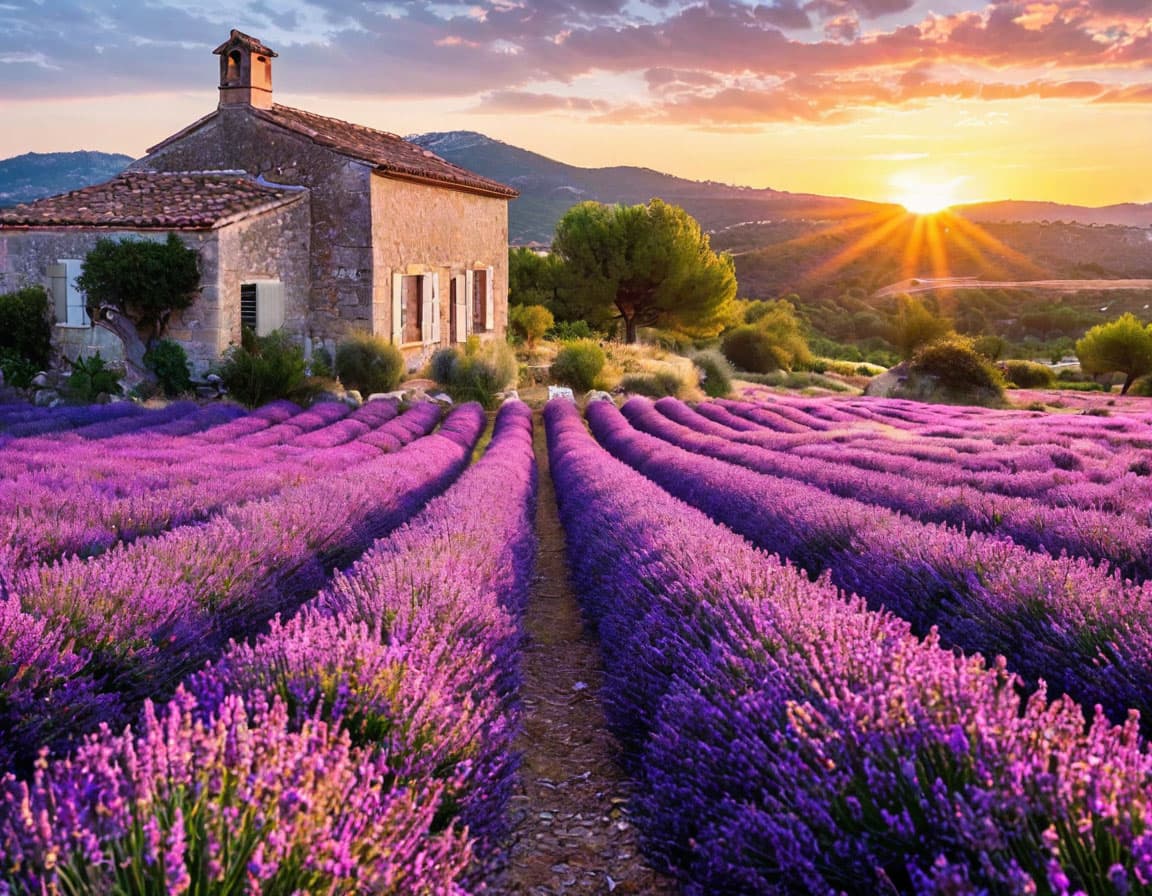The Art of the Artichoke
A Taste of Provence’s Timeless Culinary Heritage
When most people think of Provence, they imagine golden fields of lavender, the glow of ancient stone villages, and the sun-drenched vineyards that spill out across the landscape. But beneath this idyllic surface lies another treasure that has been quietly thriving in the region’s soil for centuries: the artichoke.
This humble vegetable, often overshadowed by the region’s famous wines and olive oils, holds a rich history that intertwines with the essence of Provence itself. Every year, from late winter into spring, local markets and kitchens come alive with the harvest of this green marvel. But the true magic of the artichoke is not just in its flavor—it lies in the deep-rooted traditions and rituals that surround its cultivation, preparation, and celebration.


Photos: Pinterest
A Culinary Icon with a Rich History
The artichoke, though originating in the Mediterranean, has become a symbol of Provencal cuisine. Its cultivation can be traced back to the ancient Romans, who not only enjoyed its delicate flavor but revered it for its medicinal properties. Fast-forward to the 17th century, and the artichoke found its rightful place in the royal gardens of France. By the time it arrived in Provence, it had already become an emblem of aristocratic dining, gracing the tables of nobles in cities like Avignon and Aix-en-Provence.
Today, the artichoke is far more than a mere vegetable; it is a symbol of the region’s resilience and culinary sophistication. In Provence, every bite of the artichoke carries with it the legacy of centuries-old traditions, melding seamlessly with the rhythms of the modern-day kitchen.
The artichoke, though originating in the Mediterranean, has become a symbol of Provencal cuisine. Its cultivation can be traced back to the ancient Romans, who not only enjoyed its delicate flavor but revered it for its medicinal properties. Fast-forward to the 17th century, and the artichoke found its rightful place in the royal gardens of France. By the time it arrived in Provence, it had already become an emblem of aristocratic dining, gracing the tables of nobles in cities like Avignon and Aix-en-Provence.
Today, the artichoke is far more than a mere vegetable; it is a symbol of the region’s resilience and culinary sophistication. In Provence, every bite of the artichoke carries with it the legacy of centuries-old traditions, melding seamlessly with the rhythms of the modern-day kitchen.


Photos: Pinterest
Tasting Provence: The Artichoke at the Heart of Local Cuisine
In the markets of Provence, the artichoke takes center stage as local chefs and home cooks prepare it in myriad ways, each method an homage to the land’s rich culinary traditions. From the simple yet divine artichauts à la barigoule (artichokes cooked with white wine, herbs, and garlic) to the more complex tian de légumes (a rustic vegetable bake), the artichoke is a versatile ingredient that seamlessly complements the fresh, vibrant flavors of Provence’s other seasonal offerings.
But what truly sets the Provencal artichoke apart is its connection to the land. Grown in the rich, fertile soil of the Camargue region and the hills surrounding Marseille, these artichokes are often harvested by hand, with each tender heart carefully preserved. For locals, the process of preparing an artichoke is an act of love—a slow, deliberate practice that connects them to the earth and to the generations that came before.
In the markets of Provence, the artichoke takes center stage as local chefs and home cooks prepare it in myriad ways, each method an homage to the land’s rich culinary traditions. From the simple yet divine artichauts à la barigoule (artichokes cooked with white wine, herbs, and garlic) to the more complex tian de légumes (a rustic vegetable bake), the artichoke is a versatile ingredient that seamlessly complements the fresh, vibrant flavors of Provence’s other seasonal offerings.
But what truly sets the Provencal artichoke apart is its connection to the land. Grown in the rich, fertile soil of the Camargue region and the hills surrounding Marseille, these artichokes are often harvested by hand, with each tender heart carefully preserved. For locals, the process of preparing an artichoke is an act of love—a slow, deliberate practice that connects them to the earth and to the generations that came before.


Photos: Pinterest
A Festival of Flavors: Celebrating the Artichoke
Every spring, the region comes together to celebrate the artichoke during the Fête de l’Artichaut, an annual festival in the picturesque town of Cavaillon. Here, artichokes take on an almost mythical status, as local farmers, chefs, and artisans gather to showcase their harvests and share the flavors of the season. Visitors can enjoy guided tours of local farms, attend cooking classes, and even participate in artichoke-centric tastings that range from freshly prepared dishes to artichoke-infused wines.
For those seeking a deeper understanding of the artichoke’s place in Provencal culture, this festival offers an unparalleled opportunity to immerse yourself in the rhythms of local life. It’s a chance to taste, learn, and connect with a community whose identity is so intricately tied to the land.
Every spring, the region comes together to celebrate the artichoke during the Fête de l’Artichaut, an annual festival in the picturesque town of Cavaillon. Here, artichokes take on an almost mythical status, as local farmers, chefs, and artisans gather to showcase their harvests and share the flavors of the season. Visitors can enjoy guided tours of local farms, attend cooking classes, and even participate in artichoke-centric tastings that range from freshly prepared dishes to artichoke-infused wines.
For those seeking a deeper understanding of the artichoke’s place in Provencal culture, this festival offers an unparalleled opportunity to immerse yourself in the rhythms of local life. It’s a chance to taste, learn, and connect with a community whose identity is so intricately tied to the land.


Photos: Pinterest
The Perfect Pairing: Artichokes and Wine
No visit to Provence would be complete without indulging in the region’s exceptional wines. And there’s no better companion to an artichoke than a glass of chilled Rosé from one of the many nearby vineyards. The light, fruity notes of a Provence Rosé beautifully balance the earthy, slightly bitter flavor of the artichoke, creating a harmony that defines the region’s culinary ethos.
Vineyards around Aix-en-Provence and the Côtes de Provence are home to some of the finest examples of the local terroir, where the delicate balance of sun, wind, and soil produces wines that are as vibrant and distinct as the artichokes that grow nearby. For those with a deep interest in both food and wine, a vineyard tour and tasting in this region is an experience that should not be missed.
No visit to Provence would be complete without indulging in the region’s exceptional wines. And there’s no better companion to an artichoke than a glass of chilled Rosé from one of the many nearby vineyards. The light, fruity notes of a Provence Rosé beautifully balance the earthy, slightly bitter flavor of the artichoke, creating a harmony that defines the region’s culinary ethos.
Vineyards around Aix-en-Provence and the Côtes de Provence are home to some of the finest examples of the local terroir, where the delicate balance of sun, wind, and soil produces wines that are as vibrant and distinct as the artichokes that grow nearby. For those with a deep interest in both food and wine, a vineyard tour and tasting in this region is an experience that should not be missed.


Photos: Pinterest
Bespoke Tours
to France
Indulge in the art of French sophistication with our tailor-made luxury tours. From hidden château stays to exclusive wine and art experiences, immerse yourself in the romance of France. Begin your journey today.



Why the Artichoke Still Matters in Provence
As tourism in Provence continues to grow, the region’s culinary traditions, including its reverence for the artichoke, remain a vital part of its identity. While many visitors come for the sun, the beaches, and the lavender fields, it is the local produce—artichokes included—that allows travelers to truly understand the spirit of this place. The artichoke, much like the land it comes from, is a testament to the enduring beauty of simplicity, the importance of tradition, and the ever-evolving story of French cuisine.
So, the next time you find yourself strolling through a Provencal market or savoring a meal at a local bistro, take a moment to appreciate the humble artichoke. It is a small but powerful reflection of the soul of Provence—a place where food is not just something to eat, but something to experience.
As tourism in Provence continues to grow, the region’s culinary traditions, including its reverence for the artichoke, remain a vital part of its identity. While many visitors come for the sun, the beaches, and the lavender fields, it is the local produce—artichokes included—that allows travelers to truly understand the spirit of this place. The artichoke, much like the land it comes from, is a testament to the enduring beauty of simplicity, the importance of tradition, and the ever-evolving story of French cuisine.
So, the next time you find yourself strolling through a Provencal market or savoring a meal at a local bistro, take a moment to appreciate the humble artichoke. It is a small but powerful reflection of the soul of Provence—a place where food is not just something to eat, but something to experience.
Get Inspired by Vengo
Explore the finest destinations in luxury
Sign up to our Newsletter



Be the first to uncover thrilling destinations and captivating stories by subscribing to our newsletter. Your privacy is our priority, and you can unsubscribe anytime.
By submitting this form, you are confirming you have read and agreed to our Privacy Policy.
Vengo
- About Us
- Get a Quote
- Join the Club
- Contact Us
- Reviews
Useful
- Terms and Conditions
- Privacy Policy
- FAQ
- Careers
Ideas
- Vengo Blog
- Luxury Guides
- Month-by-Month
- Stories
We use our own and third-party cookies to improve our services. If you continue browsing or click on the accept button on this banner, we understand that you accept the use of cookies on our website. For more information visit our Cookies Policy.

